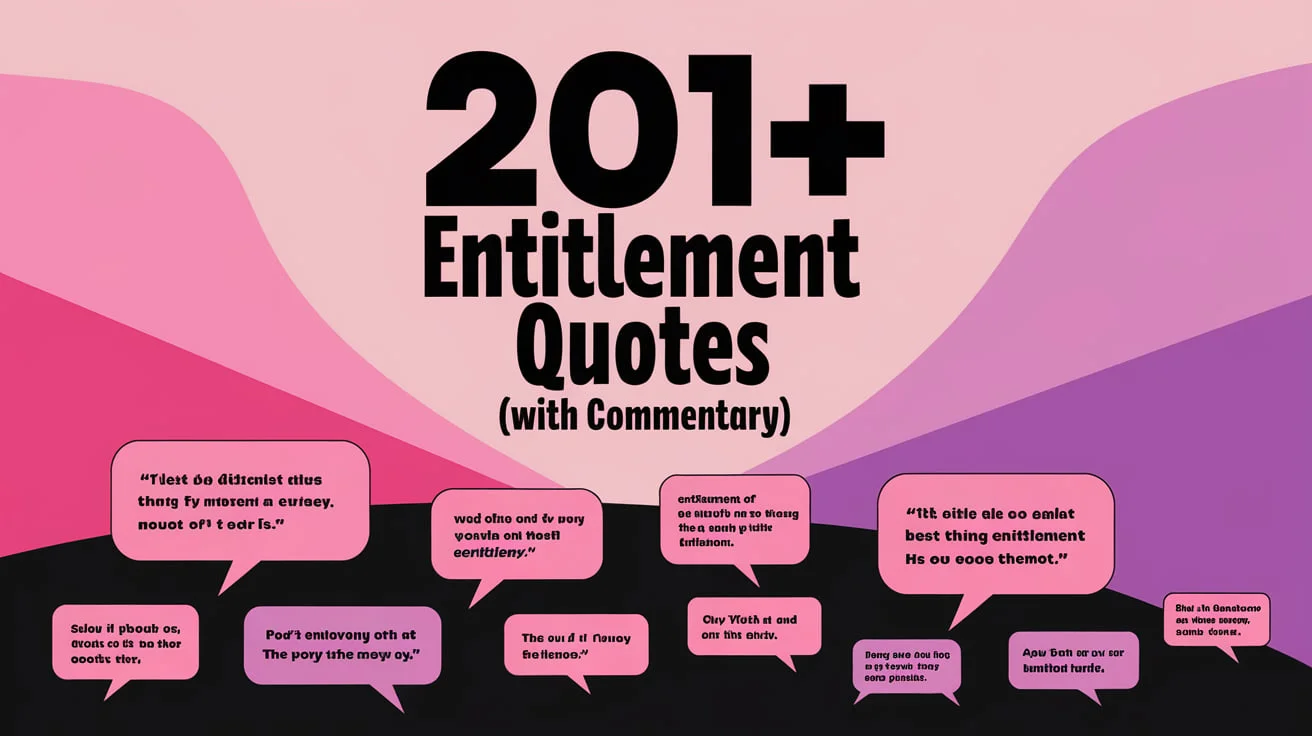Discover powerful Entitlement Quotes that inspire self-awareness, challenge perspectives, and motivate personal growth. Entitlement, in its various forms, can be a deeply ingrained mindset that shapes how we view the world and interact with others.
It can manifest in believing that one deserves special treatment, success, or privileges without necessarily earning them. These quotes on entitlement offer insight into how this mindset affects individuals and societies, often leading to resentment, unrealistic expectations, and unfulfilled desires. Through these reflections, we can recognize the difference between feeling worthy and assuming a sense of superiority over others.
Defining Entitlement Understanding the Root Cause
- “Entitlement is the belief that the world owes you something without effort on your part.”
- “The root of entitlement lies in the expectation of rewards without responsibility.”
- “Those who feel entitled often fail to realize the value of hard work and perseverance.”
- “Entitlement doesn’t come from what you’ve earned, but from what you think you deserve.”
- “A sense of entitlement is a silent thief, taking away the joy of earning and achieving.”
- “When you feel entitled, you stop appreciating what you have and demand more without merit.”
- “Entitlement comes from a disconnect between reality and expectation.”
- “Entitlement isn’t a right; it’s a mindset that leads to frustration and disappointment.”
- “The moment we begin to believe we deserve something without earning it, we lose the power to create it.”
- “Entitlement is the mindset that prevents growth by expecting rewards without effort.”
- “Entitlement is rooted in insecurity; it seeks validation and recognition from others.”
- “An entitled person believes the world is a vending machine: you put in nothing, yet expect everything.”
- “True success comes not from entitlement but the effort put into achieving it.”
- “The expectation that things should be handed to you fosters a sense of inadequacy in the long run.”
- “Entitlement clouds your vision, making you believe that success is guaranteed rather than earned.”
- “At the heart of entitlement is the refusal to accept the reality of personal responsibility.”
- “Those who feel entitled often forget the effort that goes into creating opportunities.”
- “Entitlement can blind you to the struggles and sacrifices others have made.”
- “Believing you deserve things without working for them leads to resentment when they don’t come.”
- “Entitlement stems from comparing yourself to others, believing that your circumstances should mirror theirs.”
The Dark Side of Entitlement How It Shapes Our Interactions
- “Entitled people rarely consider the consequences of their actions on others.”
- “The most damaging part of entitlement is how it creates a sense of superiority over others.”
- “Entitlement doesn’t just harm the individual, it erodes relationships and trust.”
- “When you feel entitled, you believe that your needs are more important than anyone else’s.”
- “Entitlement fosters a me-first attitude, disregarding the needs and feelings of others.”
- “The entitled person sees themselves as deserving of special treatment, regardless of the cost to others.”
- “Entitlement is a dangerous mindset because it can isolate you from the reality of human relationships.”
- “Those who live with entitlement struggle with empathy because they expect the world to revolve around them.”
- “Entitlement makes it difficult to experience gratitude because you are constantly focused on what you think is owed to you.”
- “When you feel entitled, you stop seeing others as equals and start viewing them as tools for your gain.”
- “Entitlement undermines genuine connections, turning relationships into transactional exchanges.”
- “The more you expect, the less you appreciate, and entitlement feeds that insatiable hunger.”
- “A sense of entitlement is corrosive, making it difficult to appreciate the efforts of others.”
- “Entitled individuals often take credit for things they didn’t earn, leaving others feeling unseen and unappreciated.”
- “When you feel entitled to success, failure becomes harder to accept because it contradicts your inflated self-worth.”
- “Entitlement breeds arrogance, often leading to toxic environments where collaboration becomes impossible.”
- “An entitled attitude ignores the collective effort and focuses solely on the individual’s desires.”
- “Entitlement leaves little room for humility, which is essential for growth and learning.”
- “Entitlement creates a sense of ownership over things that are not rightfully yours.”
- “The entitled mindset leads to resentment when reality doesn’t conform to your unrealistic expectations.”
The Cost of Entitlement How It Affects Personal Growth
- “Entitlement prevents growth by making you believe that things should come easily.”
- “Entitled people often feel frustrated because the world doesn’t meet their inflated expectations.”
- “The entitlement mindset keeps you stuck in the belief that things are owed to you, preventing you from taking action.”
- “If you live with entitlement, you miss the opportunity to learn the value of resilience and hard work.”
- “Entitlement creates the illusion that success is given rather than earned, leading to a sense of unfulfilled potential.”
- “When you feel entitled, you stop pushing yourself because you believe success should come without effort.”
- “Living with entitlement leads to complacency because you believe things should happen for you without struggle.”
- “Those who feel entitled often avoid taking responsibility for their failures, blaming others instead.”
- “Entitlement can delay the inevitable growth that comes from facing challenges head-on.”
- “The more entitled you feel, the less likely you are to acknowledge your role in shaping your destiny.”
- “Entitlement makes you blind to the opportunities that are within your control to create.”
- “The sense of entitlement robs you of the satisfaction of achieving something through your effort.”
- “A mindset of entitlement leads to missed lessons—growth only comes through perseverance, not handouts.”
- “Entitlement can stifle ambition, replacing it with a passive expectation of rewards.”
- “Growth is a product of self-reflection and hard work, not the entitlement to things you haven’t earned.”
- “When you feel entitled, you are less likely to embrace failure as a lesson and more likely to avoid it.”
- “Living in entitlement denies you the growth that comes from persistence and learning from your mistakes.”
- “The entitlement mentality traps you in a cycle of dependence and frustration.”
- “You cannot achieve greatness if you are constantly waiting for it to be handed to you.”
- “By expecting success without effort, you eliminate the possibility of true, transformative growth.”
Entitlement and Society The Ripple Effect on Communities
- “When entitlement becomes the norm, it erodes the spirit of community and mutual respect.”
- “A society built on entitlement thrives on division, not unity.”
- “Entitlement leads to unrealistic expectations, which weaken the foundation of shared responsibility.”
- “Entitlement in a community fosters an ‘us vs. them’ mentality rather than collaboration.”
- “In a culture of entitlement, the focus shifts from collective progress to individual gain.”
- “When entitlement spreads, so does dissatisfaction, as people expect more than they are willing to contribute.”
- “Entitlement leads to inequality, as some individuals demand privileges that others do not have access to.”
- “A sense of entitlement in a community often undermines the values of fairness and justice.”
- “When entitlement prevails, the work of the collective becomes less valued than individual interests.”
- “Communities that embrace entitlement lose sight of the importance of mutual respect and shared sacrifice.”
- “The entitlement mentality divides people by creating a sense of deservingness that excludes others.”
- “In societies that emphasize entitlement, the concept of earning and deserving is lost.”
- “The culture of entitlement fosters an environment of competition instead of cooperation.”
- “When entitlement replaces gratitude, it leads to greater discontentment within a community.”
- “Entitlement creates a constant cycle of comparison, where people measure their worth based on what they believe they are owed.”
- “A society rooted in entitlement often forgets the value of empathy and support for others.”
- “The belief that one is entitled to something over others undermines the trust required to build a fair society.”
- “Entitlement in a community breeds resentment, as people begin to feel that their hard work is undervalued.”
- “When people feel entitled, they often neglect their responsibilities to the community, focusing only on their own needs.”
- “A society steeped in entitlement struggles to address the real issues because everyone is focused on what they believe they deserve.”
Overcoming Entitlement Shifting Our Mindset
- “To overcome entitlement, you must first recognize that the world owes you nothing.”
- “Growth begins the moment you accept that you must earn everything, not expect it.”
- “Overcoming entitlement starts with gratitude and the willingness to work for what you desire.”
- “The antidote to entitlement is humility—recognizing that nothing is owed to you.”
- “Shifting from entitlement to gratitude allows you to appreciate what you have, not just what you think you deserve.”
- “The key to overcoming entitlement is realizing that success comes from effort, not from expectation.”
- “Entitlement can be replaced with a mindset of abundance when you start appreciating what you earn.”
- “The more you let go of entitlement, the more you make room for personal growth and achievement.”
- “To overcome entitlement, focus on self-reliance and the value of perseverance.”
- “When you take responsibility for your own life, you break free from the chains of entitlement.”
- “Acknowledging that nothing is guaranteed forces you to take action rather than waiting for rewards.”
- “Overcoming entitlement requires a shift from wanting to earning and from demanding to appreciating.”
- “Success becomes more meaningful when it is something you’ve worked for, not something you believe you deserve.”
- “Letting go of entitlement means embracing discomfort as a part of growth and learning.”
- “Overcoming entitlement requires courage—the courage to accept that nothing comes without effort.”
- “A true sense of worth comes from what you contribute, not from what you think you’re owed.”
- “To overcome entitlement, you must learn to value the journey, not just the destination.”
- “Breaking free from entitlement starts with focusing on what you can give, not just what you can take.”
- “To shift away from entitlement, cultivate gratitude for every effort, every opportunity, and every lesson learned.”
- “Overcoming entitlement is a process of learning to value yourself based on your actions, not your expectations.”
The Entitlement Trap How It Holds Us Back
- “The entitlement trap is believing that everything should come easily, without effort or struggle.”
- “Entitlement makes you blind to the hard work and sacrifices required for success.”
- “The trap of entitlement is that it prevents you from appreciating the journey toward your goals.”
- “When you feel entitled, you stop asking, ‘What can I do?’ and start demanding, ‘What should I get?’”
- “Living in the entitlement trap keeps you from seeing the countless opportunities that require hard work.”
- “The entitlement trap is a self-imposed limitation—expecting things to happen instead of creating them.”
- “Entitlement locks you into a cycle of dependency, where you wait for things rather than earn them.”
- “The more entitled you feel, the less you learn from your mistakes, and the harder it is to grow.”
- “Entitlement discourages initiative, making it hard to take proactive steps toward achieving goals.”
- “The entitlement trap is a lack of responsibility for your own life and outcomes.”
- “Believing that things should be handed to you makes it difficult to build resilience and overcome obstacles.”
- “Living in entitlement isolates you from the reality of effort and achievement, making success seem elusive.”
- “The trap of entitlement is that it focuses on what you deserve, not on what you need to earn.”
- “When you operate from a place of entitlement, you trap yourself in frustration, expecting rewards without work.”
- “The entitlement trap leads you to expect the world to bend to your will, rather than adapting to the challenges around you.”
- “Entitlement creates a barrier between you and your true potential, as it prevents you from seeing where real growth happens.”
- “Those stuck in the entitlement trap often fail to acknowledge the role of perseverance in achieving success.”
- “The entitlement trap prevents you from taking responsibility, pushing the blame onto circumstances and others.”
- “The belief that you’re owed something doesn’t propel you forward; it holds you back from taking ownership of your life.”
- “The entitlement trap keeps you from developing a strong work ethic, leading to chronic dissatisfaction.”
Entitlement in Modern Society A Growing Trend
- “In modern society, entitlement is often mistaken for self-worth and assertiveness.”
- “The culture of entitlement is growing, with increasing demands for instant gratification.”
- “In today’s world, entitlement is encouraged by the instant access to information and rewards.”
- “Social media fuels entitlement by creating unrealistic expectations about success and happiness.”
- “Modern society breeds entitlement by rewarding those who demand rather than earn.”
- “The rise of entitlement is a direct result of a consumer-driven society that prioritizes convenience over effort.”
- “In the age of instant gratification, entitlement is becoming a default expectation rather than a rare mindset.”
- “Technology and fast-paced living foster a culture of entitlement, where waiting and effort are seen as unnecessary.”
- “Entitlement in modern society often leads to a disconnection from the value of hard work and perseverance.”
- “The more connected we are digitally, the more we begin to expect the same instant responses from the world.”
- “Entitlement in the digital age is a constant comparison game, where success is measured by the ease of access rather than effort.”
- “In a society that prizes speed and convenience, entitlement has become a shortcut to feeling validated.”
- “Modern entitlement grows from a lack of patience and an over-reliance on the ease of digital solutions.”
- “In a world where everything is available at the click of a button, entitlement has flourished as the norm.”
- “The culture of instant gratification fosters a sense of entitlement, where people believe everything should be available now.”
- “With the constant bombardment of advertisements, entitlement grows as people believe they deserve things without effort.”
- “Entitlement in today’s society is often linked to the idea that success should come easily, without struggle.”
- “A growing sense of entitlement today reflects a shift away from personal responsibility and towards external validation.”
- “In the age of technology and constant connectivity, entitlement often masquerades as a legitimate expectation of convenience.”
- “The rise of entitlement in modern society highlights the importance of teaching resilience and perseverance to counteract this trend.”
Entitlement vs Empowerment Finding the Balance
- “Entitlement is the belief that something is owed to you, while empowerment is about creating your opportunities.”
- “True empowerment comes from within, not from the expectation that the world should give you what you desire.”
- “To be empowered, you must take responsibility for your actions, not expect rewards without effort.”
- “The balance between entitlement and empowerment lies in understanding that you can create your success, rather than waiting for it to come.”
- “Empowerment is about recognizing your value, while entitlement is the belief that others must recognize it.”
- “To feel empowered, you need to embrace the effort it takes to achieve, rather than expecting things to fall into your lap.”
- “Entitlement blinds you to your potential, while empowerment helps you see the strength within you.”
- “Empowerment is the freedom to take control of your life, while entitlement keeps you trapped in a cycle of waiting for others to give.”
- “True empowerment requires letting go of entitlement and embracing the power of self-reliance.”
- “When you feel entitled, you are waiting for someone else to act; when you are empowered, you take action yourself.”
- “Empowerment is a reflection of confidence in your ability to create, while entitlement is rooted in dissatisfaction with what you have.”
- “You cannot feel empowered if you are constantly expecting others to meet your needs.”
- “Entitlement blocks the path to empowerment because it fosters dependency instead of independence.”
- “Empowerment is about understanding that success is earned, not given.”
- “Empowerment grows from effort, while entitlement grows from laziness and unrealistic expectations.”
- “Entitlement creates an illusion of security, while empowerment provides the actual tools for growth and resilience.”
- “To empower yourself, you must shed the need for validation that entitlement thrives on.”
- “The difference between entitlement and empowerment is that entitlement keeps you stuck, while empowerment propels you forward.”
- “Empowerment doesn’t involve demanding—it’s about owning your worth and working to realize your potential.”
- “Empowerment is the path of self-determination, whereas entitlement is a dead-end of expectation.”
Entitlement in Parenting Raising Children with Realistic Expectations
- “Entitled children often struggle with gratitude because they have been given everything without earning it.”
- “When parents raise children with unrealistic expectations, they create a sense of entitlement that hinders emotional development.”
- “Raising a child with entitlement robs them of the valuable lessons that come from earning and working for success.”
- “Entitlement in parenting is about giving children the world without teaching them the value of hard work.”
- “Children raised with entitlement often believe that their needs are more important than the needs of others.”
- “Teaching children to be entitled creates adults who expect to be treated especially without understanding the effort behind achievements.”
- “Parents who foster entitlement in their children often find that their children struggle with disappointment in the real world.”
- “Entitled children often lack empathy because they have never been taught to consider the feelings of others.”
- “The key to overcoming entitlement in children is teaching them gratitude and the importance of hard work.”
- “When entitlement is ingrained in children, they expect to be rewarded without understanding the cost of success.”
- “Entitlement in parenting creates children who believe they deserve more than they’ve earned.”
- “Raising children without a sense of entitlement requires teaching them the value of patience, perseverance, and humility.”
- “Parents who indulge their children’s every wish risk raising entitled individuals who struggle with failure.”
- “Entitled children often fail to learn important life skills because they expect everything to be handed to them.”
- “Teaching children that life’s rewards are earned, not given, is the antidote to entitlement.”
- “Entitlement in parenting often leads to children who struggle with resilience when faced with challenges.”
- “Parents must balance providing for their children with teaching them the importance of self-sufficiency and effort.”
- “Children raised with entitlement are often unprepared for the challenges and disappointments of adulthood.”
- “Raising children with realistic expectations fosters a sense of accomplishment and self-worth that entitlement never will.”
- “Entitlement in parenting creates a false sense of security, where children grow up believing that they are entitled to success and privilege.”
Entitlement and Leadership Leading with Humility and Integrity
- “Entitlement in leadership creates a culture where leaders expect respect without earning it.”
- “A true leader doesn’t demand loyalty, they earn it through integrity and empathy.”
- “Leaders who feel entitled alienate their teams, making them feel undervalued and unappreciated.”
- “Entitlement in leadership leads to decisions made for personal gain, rather than the good of the team.”
- “Great leaders don’t view themselves as entitled to power; they recognize the responsibility that comes with it.”
- “Leaders who are entitled struggle with criticism because they believe their authority is beyond reproach.”
- “Entitled leadership is an illusion that ignores the necessity of collaboration and respect.”
- “Leaders who believe they are entitled to admiration undermine the trust and respect they should be building.”
- “True leadership is based on service and humility, not on feeling entitled to accolades or praise.”
- “Entitlement in leadership creates a toxic environment where those in power feel untouchable.”
- “Leaders who foster entitlement among their teams discourage creativity and autonomy.”
- “A leader who feels entitled to success will often take credit for team achievements, diminishing the contributions of others.”
- “The best leaders don’t demand respect—they earn it through hard work and leading by example.”
- “Entitled leadership undermines the collective effort, focusing instead on personal entitlement.”
- “Effective leaders lead with humility, knowing that they are there to serve and support, not to demand.”
- “Entitlement in leadership leads to micromanagement, where leaders feel the need to control every aspect of their team’s work.”
- “True leadership requires understanding that no one is entitled to success, but must earn it through integrity and dedication.”
- “Entitled leaders often neglect the well-being of their teams, focusing on their power and status.”
- “Leadership without entitlement involves humility, respect, and a willingness to empower others.”
- “A leader who does not feel entitled recognizes that success is a team effort and that no one person is above the process.”
Final Thought
Entitlement, when left unchecked, can permeate every area of life, from personal relationships to professional environments. It creates an unhealthy expectation that success, respect, and privileges should be given rather than earned. Overcoming entitlement requires us to shift our mindset, embracing the values of hard work, humility, and responsibility. In a world that often promotes instant gratification, it is crucial to remind ourselves that the true rewards of life come from perseverance and resilience, not from expecting the world to owe us anything.

Bella Marie is a creative writer and the imaginative mind behind Quotes Nexus. With a passion for expressing the beauty of life through words, Bella crafts quotes that inspire and uplift. Her writing captures the essence of love, friendship, and personal growth, making her a beloved voice among readers who seek motivation and connection.













